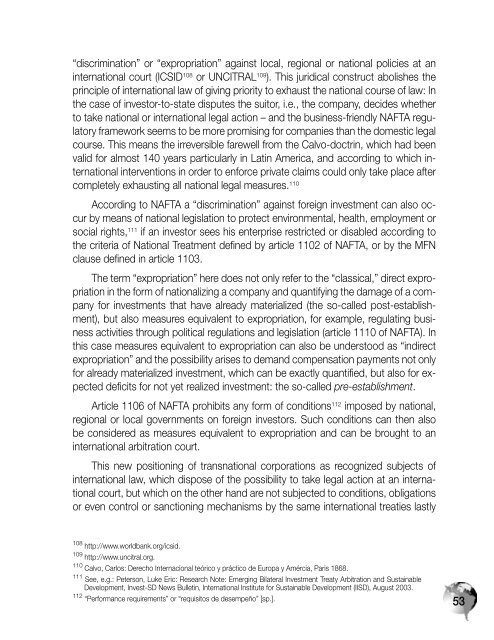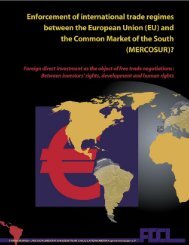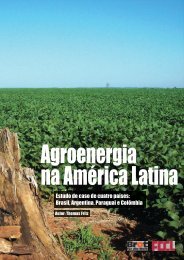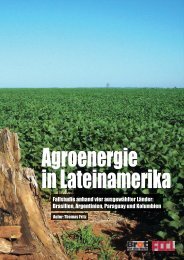(EU) and the Common Market of the South (MERCOSUR)? - FDCL
(EU) and the Common Market of the South (MERCOSUR)? - FDCL
(EU) and the Common Market of the South (MERCOSUR)? - FDCL
You also want an ePaper? Increase the reach of your titles
YUMPU automatically turns print PDFs into web optimized ePapers that Google loves.
“discrimination” or “expropriation” against local, regional or national policies at an<br />
international court (ICSID 108 or UNCITRAL 109 ). This juridical construct abolishes <strong>the</strong><br />
principle <strong>of</strong> international law <strong>of</strong> giving priority to exhaust <strong>the</strong> national course <strong>of</strong> law: In<br />
<strong>the</strong> case <strong>of</strong> investor-to-state disputes <strong>the</strong> suitor, i.e., <strong>the</strong> company, decides whe<strong>the</strong>r<br />
to take national or international legal action – <strong>and</strong> <strong>the</strong> business-friendly NAFTA regulatory<br />
framework seems to be more promising for companies than <strong>the</strong> domestic legal<br />
course. This means <strong>the</strong> irreversible farewell from <strong>the</strong> Calvo-doctrin, which had been<br />
valid for almost 140 years particularly in Latin America, <strong>and</strong> according to which international<br />
interventions in order to enforce private claims could only take place after<br />
completely exhausting all national legal measures. 110<br />
According to NAFTA a “discrimination” against foreign investment can also occur<br />
by means <strong>of</strong> national legislation to protect environmental, health, employment or<br />
social rights, 111 if an investor sees his enterprise restricted or disabled according to<br />
<strong>the</strong> criteria <strong>of</strong> National Treatment defined by article 1102 <strong>of</strong> NAFTA, or by <strong>the</strong> MFN<br />
clause defined in article 1103.<br />
The term “expropriation” here does not only refer to <strong>the</strong> “classical,” direct expropriation<br />
in <strong>the</strong> form <strong>of</strong> nationalizing a company <strong>and</strong> quantifying <strong>the</strong> damage <strong>of</strong> a company<br />
for investments that have already materialized (<strong>the</strong> so-called post-establishment),<br />
but also measures equivalent to expropriation, for example, regulating business<br />
activities through political regulations <strong>and</strong> legislation (article 1110 <strong>of</strong> NAFTA). In<br />
this case measures equivalent to expropriation can also be understood as “indirect<br />
expropriation” <strong>and</strong> <strong>the</strong> possibility arises to dem<strong>and</strong> compensation payments not only<br />
for already materialized investment, which can be exactly quantified, but also for expected<br />
deficits for not yet realized investment: <strong>the</strong> so-called pre-establishment.<br />
Article 1106 <strong>of</strong> NAFTA prohibits any form <strong>of</strong> conditions 112 imposed by national,<br />
regional or local governments on foreign investors. Such conditions can <strong>the</strong>n also<br />
be considered as measures equivalent to expropriation <strong>and</strong> can be brought to an<br />
international arbitration court.<br />
This new positioning <strong>of</strong> transnational corporations as recognized subjects <strong>of</strong><br />
international law, which dispose <strong>of</strong> <strong>the</strong> possibility to take legal action at an international<br />
court, but which on <strong>the</strong> o<strong>the</strong>r h<strong>and</strong> are not subjected to conditions, obligations<br />
or even control or sanctioning mechanisms by <strong>the</strong> same international treaties lastly<br />
108<br />
http://www.worldbank.org/icsid.<br />
109<br />
http://www.uncitral.org.<br />
110<br />
Calvo, Carlos: Derecho Internacional teórico y práctico de Europa y Amércia, Paris 1868.<br />
111<br />
See, e.g.: Peterson, Luke Eric: Research Note: Emerging Bilateral Investment Treaty Arbitration <strong>and</strong> Sustainable<br />
Development, Invest-SD News Bulletin, International Institute for Sustainable Development (IISD), August 2003.<br />
112<br />
“Performance requirements” or “requisitos de desempeño” [sp.].<br />
53









